Medical news on July 4: Concern that children may have sinusitis relapse after swimming
Water in swimming pools is often disinfected with chlorine, which irritates the nasal and sinus mucosa, causing children to have recurring sinusitis after swimming in the summer.
Children can have recurrent sinusitis from swimming.
According to information from a medical facility in Ho Chi Minh City, during the summer break, from mid-May until now, the hospital has received more than 50 children for examination due to recurrent sinusitis after swimming, mainly children between 7-12 years old.
According to doctors, sinusitis is a condition in which the lining of the sinuses next to the nose becomes inflamed, accumulates fluid and mucus, and the opening from the sinuses to the nose becomes blocked.
Children with sinusitis are inherently very “sensitive” to allergens. Chlorine in swimming pool water can irritate the nasal and sinus mucosa of children, increasing the risk of infection, causing the disease to recur or worsening existing sinusitis.
The Pediatric Otolaryngology Association (PENTA) of Children's Hospital of Alabama (USA) recommends that children can get sinusitis from swimming in pools or natural waters in the summer. The cause is due to chlorinated water or unsanitary water entering the child's nose, causing sinus irritation.
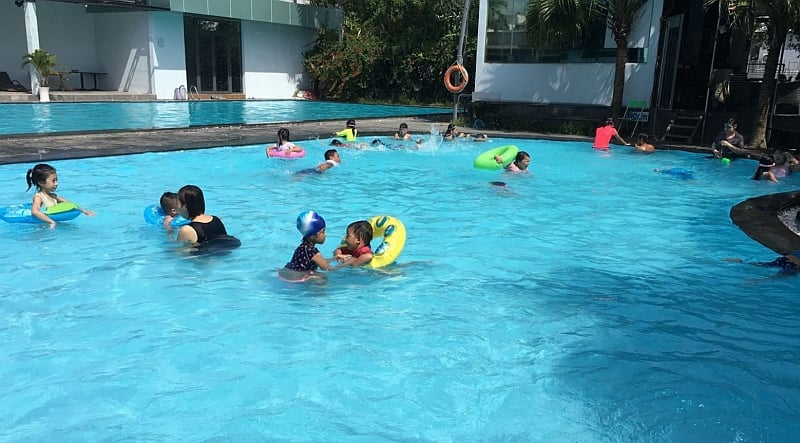 |
| Illustration |
A study by Bernard A et al. on “The Impact of Chlorinated Swimming Pool Visits on Respiratory Health of Adolescents” (2009), showed that adolescents who swim in chlorinated pools are at risk of respiratory illness, including sinusitis, according to the US National Center for Health Research.
Children with a history of sinusitis often experience itchy nose, sore nose, prolonged nasal congestion, headache after swimming; more severe symptoms include facial pain, headache, difficulty breathing, yellow-green nasal discharge with a fishy smell, and nasal discharge running down the throat.
Case of child NKH (10 years old, Thu Duc) had stuffy nose, sneezing continuously, runny nose, after swimming 3 times/week this summer. H. went swimming for about 2 weeks and this symptom appeared and took medicine according to the old prescription for sinusitis treatment given by the doctor 3 months ago.
But the symptoms did not improve, H. had a headache, facial pain and swelling, sore cheeks, stuffy nose, yellow, smelly nasal discharge. H. was taken to the ENT Center by her parents.
After a clinical examination, medical history and ENT endoscopy, Dr. Hang said that H. had recurrent sinusitis, pus and mucus discharge, and swelling of the nasal mucosa. The doctor prescribed aspiration to clear the sinuses, prescribed oral medication and nasal spray. H. should not go swimming during this period, should not get caught in the rain, should not go to dusty places and should return for a check-up after 1 week so that the doctor can continue to monitor and completely treat the disease.
Or the case of HLP (8 years old, from Quang Ngai ) was brought in by his mother for a follow-up examination after 1 week of treatment for recurrent sinusitis. P. had a history of sinusitis, nasal congestion, nasal discomfort, sneezing every time the weather changed, when lying in air conditioning, and was "sensitive" to allergens.
This summer, because the house is near the beach, P. and his friends often go swimming together every day. After 2 weeks, P. had a relapse of sinusitis, prolonged nasal congestion, difficulty breathing, headache, and mild fever. P.'s mother said that her son loves swimming, so he often goes to the beach and swims in public pools.
After the ENT endoscopy, Dr. Hang said that P.'s sinuses had a lot of thick mucus flowing from the back of his nose down to his throat, and his nasal turbinates were swollen. P. was also prescribed to have the fluid drained to help clear his sinuses, and to rinse his nose with saline solution daily, along with taking medication as prescribed by his doctor; he was not allowed to go swimming during this period.
Dr. Tran Thi Thuy Hang, Head of the Department of Otorhinolaryngology, Tam Anh General Hospital, Ho Chi Minh City, explained that if you do not have sinusitis, you should give up your hobby of swimming. For children, parents should pay attention and give them careful instructions to prevent sinusitis from recurring. Some notes when swimming for people with sinusitis include: avoid swimming immediately after the pool is treated with chlorine because the chlorine concentration is very high at this time; use earplugs and nose clips when swimming; you can swim on your back to limit water from entering your nose and throat; shower immediately after swimming.
Before swimming, prepare nasal drops and salt water to gargle; when swimming, minimize choking on water and drinking pool water; shower immediately and clean your nose and throat after swimming. Do not swim for too long to avoid catching a cold in your body and respiratory system. Do not swim too many times a week, only swim for about 30 minutes and about 2 times a week.
If you accidentally choke on water, blow the water out of your nose, tilt your head, shake your head gently and straighten your earlobe to let the water drain out. Do not go swimming when your sinusitis is recurring and your symptoms are at their peak. If the disease has just started, you should postpone swimming and take medication prescribed by your doctor to relieve symptoms.
The risks of eating strange insects
The Food Safety Department, Ministry of Health has repeatedly warned about poisoning and even death caused by eating strange insects.
However, recently, some hospitals have continuously received patients who were poisoned after eating caterpillars, coconut worms, stink bugs, etc.
Experts warn that with strange insects, people need to be careful and absolutely do not listen to "rumors" to process them into food.
Recently, the Department of Internal Medicine and Anti-Poisoning (108 Central Military Hospital) admitted a male patient, N.D.T (42 years old, from Yen Bai), who was hospitalized with fatigue, weakness in all four limbs, rhabdomyolysis, and acute renal failure. The diagnosis showed that the patient was poisoned by eating Ban Mieu worms.
Previously, 3 people in Yen Bai province ate Ban Mieu worms for dinner. About 1-3 hours after eating, all 3 people showed symptoms of nausea, abdominal pain, bloating, painful urination, etc. They were then transferred to Bach Mai Hospital with a diagnosis of poisoning.
Not only was a female patient poisoned by the Ban Mieu worm, recently a 33-year-old woman in Vinh Long had to be hospitalized after eating coconut worms. Specifically, about 3 hours after eating two coconut worms, the female patient began to experience abdominal pain, nausea, red skin, and itching all over her body, along with feeling tired and having difficulty breathing.
The family immediately transferred the patient to the Xuyen A General Hospital in Vinh Long for emergency treatment. After examination and medical history, the doctor determined that the patient had an allergic shock due to eating coconut worms and quickly gave the patient intravenous fluids, antihistamines, and corticosteroids.
Warning about the risks of dishes made from insects, according to the Food Safety Department (Ministry of Health), cases of poisoning due to eating insects recorded in provinces and cities in recent times show that the cause is often due to the use of dead insects that produce toxins or insects infected with poisonous fungi, insects containing poisonous tree sap... Poisoning can even be due to the toxins of insects not being destroyed at high temperatures during processing.
Common signs of poisoning after eating insects include: Vomiting, shaking hands and feet, convulsions, dizziness, stiff jaw, agitation, difficulty breathing, lethargy, coma, rash all over the body... and death. The symptoms appear more or less, mild or severe depending on the toxin in the insect, the number of insects eaten and the constitution of each person.
In addition to familiar dishes made from pupae, grasshoppers, crickets, etc., according to the Food Safety Department, people in mountainous areas also catch and process strange insects such as stink bugs, worms, scorpions, cicadas, etc. and consider them specialties. Even information technology has exploded with many videos about natural cuisine aimed at attracting views and likes without being verified. Not knowing clearly whether these insects are poisonous or not, how to process them properly, etc., the risk of poisoning is very high, and the death rate due to natural toxins is very high.
Furthermore, many people believe that insects are natural foods, so they are guaranteed to be clean and completely safe to use. However, experts also note that when collecting them in the wild, if not careful, people can easily confuse edible insects with inedible insects that contain toxins.
There are currently no in-depth, comprehensive studies on insects used in food processing, therefore, the Food Safety Department recommends that people absolutely do not use pupae, larvae, strange insects, dead insects or insects with shapes and colors different from natural ones to process into food.
In particular, people with allergies need to be careful when eating, if in doubt, do not eat. In case after eating there are unusual signs and symptoms such as: fatigue, dizziness, nausea, rash, abdominal pain, digestive disorders, numbness of lips, mouth, difficulty breathing... go to medical facilities immediately for timely examination and treatment.
Experts also note that when preparing dishes from insects, there must be a guaranteed processing procedure. Specifically, it is necessary to soak and wash insects with warm salt water or lime water to remove all poisonous fungi, worms, etc. on the insects and to stimulate the insects, eliminating all toxins in the intestines; at the same time, remove the intestines, wings, legs, heads, and proboscis of the insects. In addition, absolutely do not eat insects raw or undercooked.
With familiar insects used as food, when cooking, they must be thoroughly cooked and eaten immediately after preparation. When poisoned by food of insect origin, if still conscious, self-induced vomiting is required. To prevent poisoning, it is best not to eat strange insects or insects that have never been eaten before. People with allergies should be careful when enjoying these dishes.



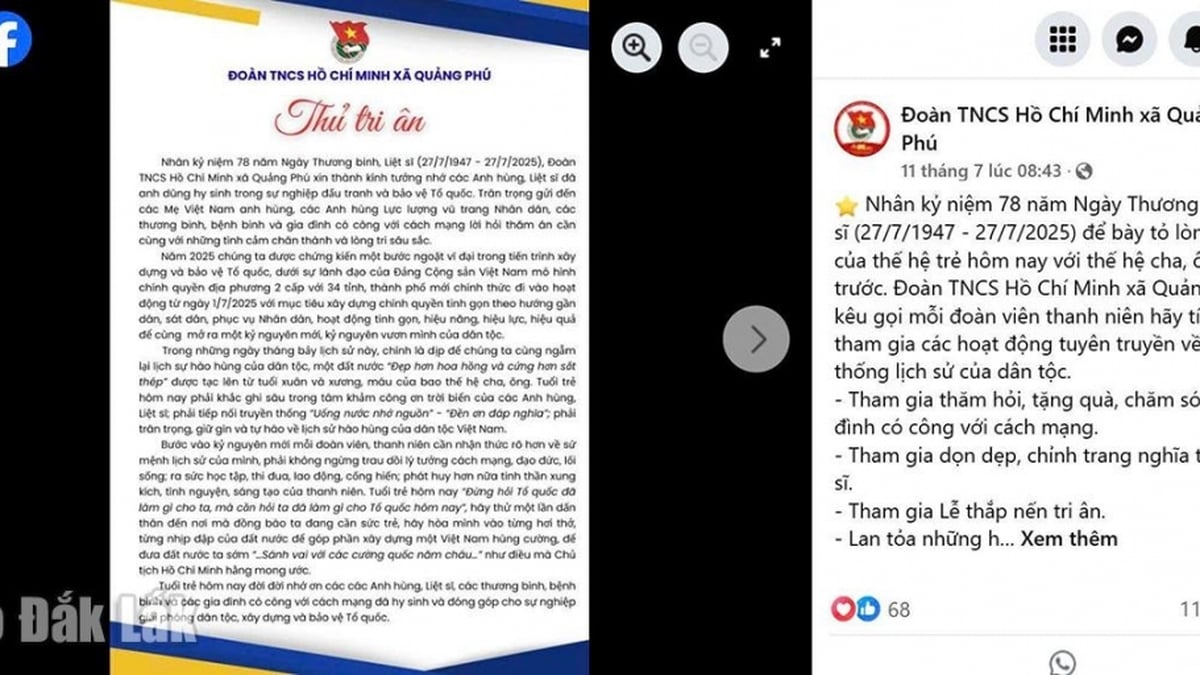


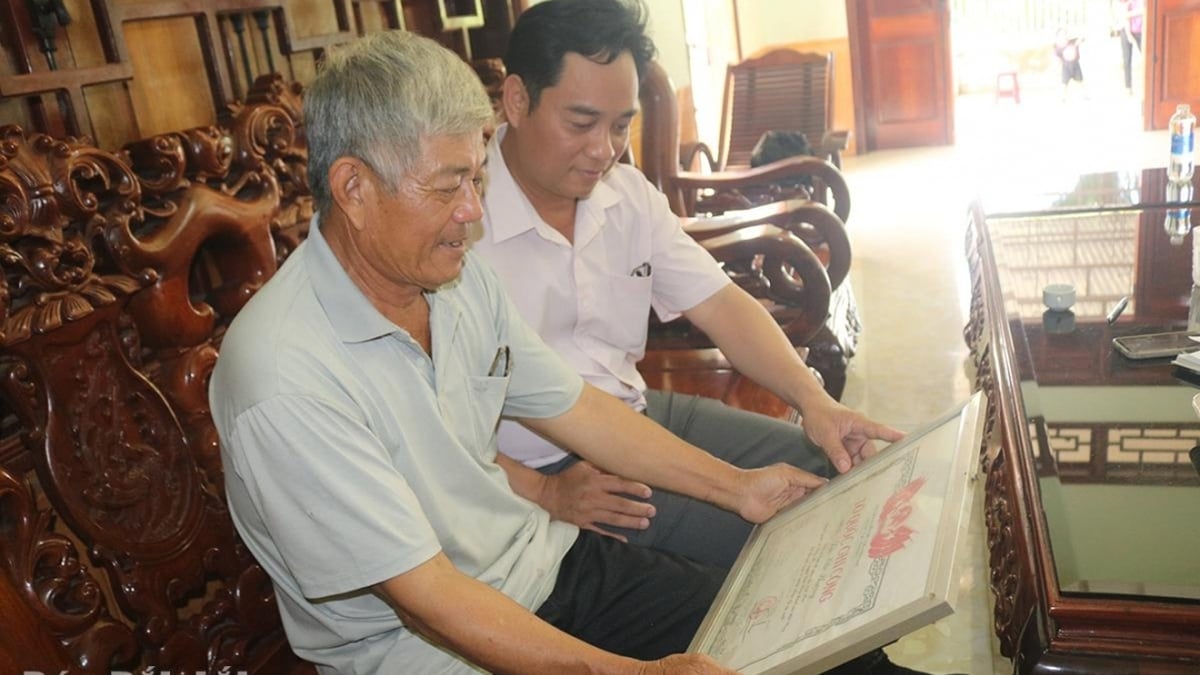

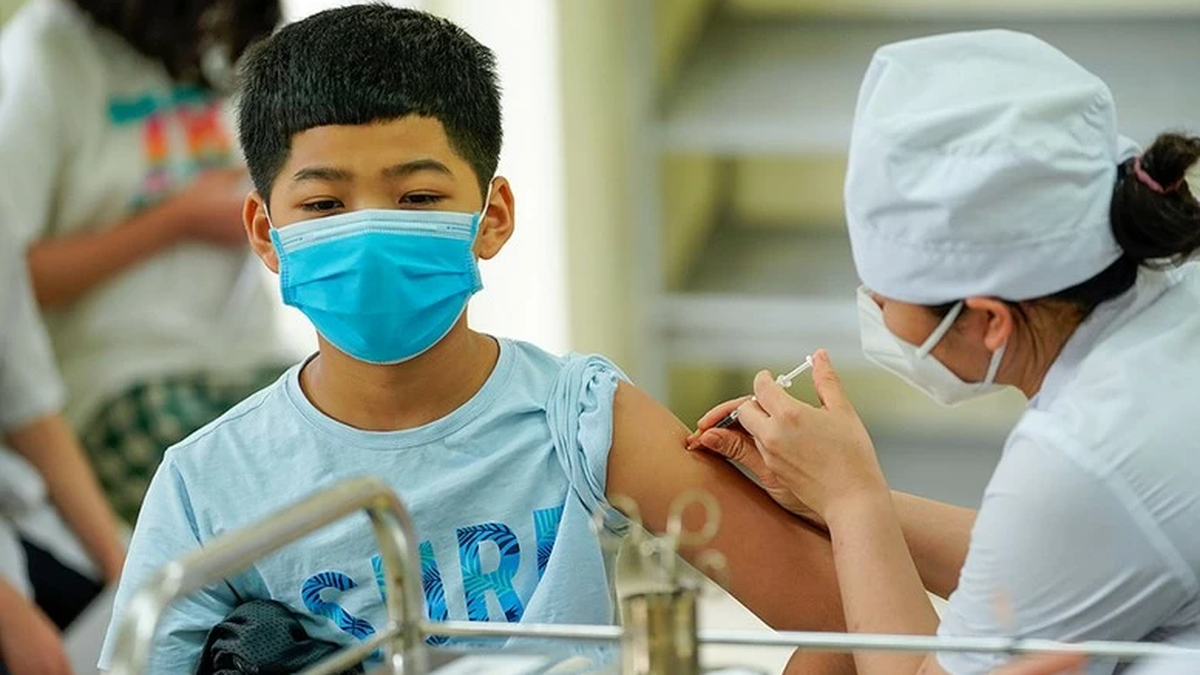


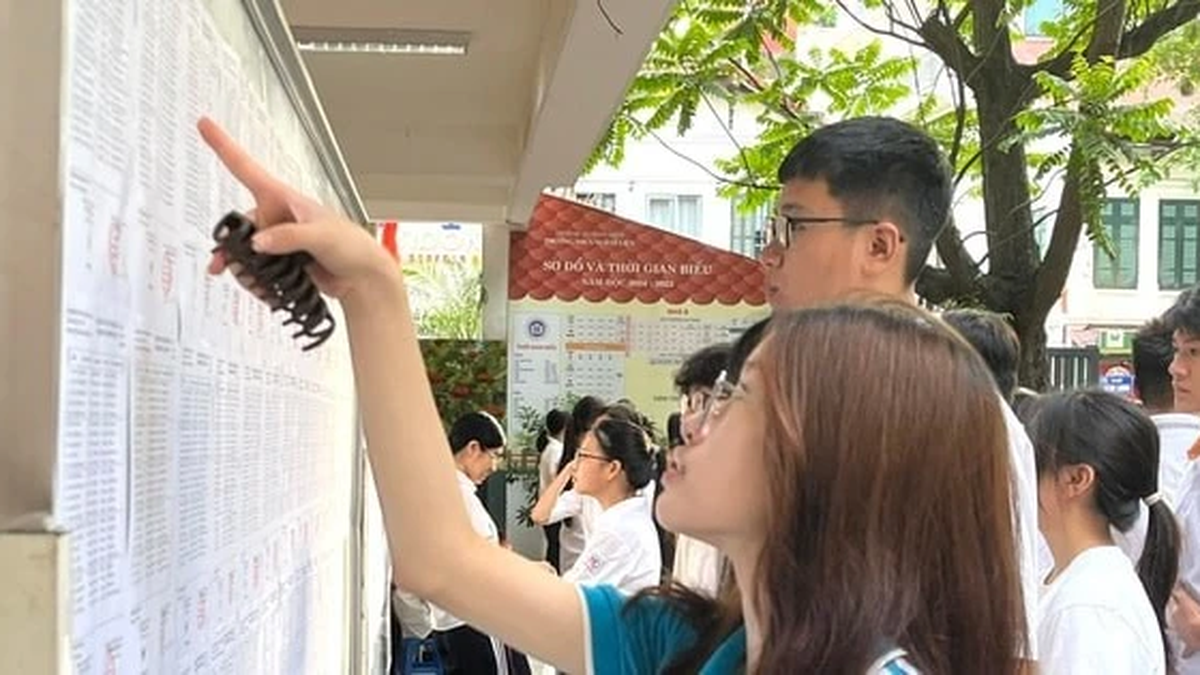


















![[Photo] National Assembly Chairman attends the seminar "Building and operating an international financial center and recommendations for Vietnam"](https://vphoto.vietnam.vn/thumb/1200x675/vietnam/resource/IMAGE/2025/7/28/76393436936e457db31ec84433289f72)





































































Comment (0)